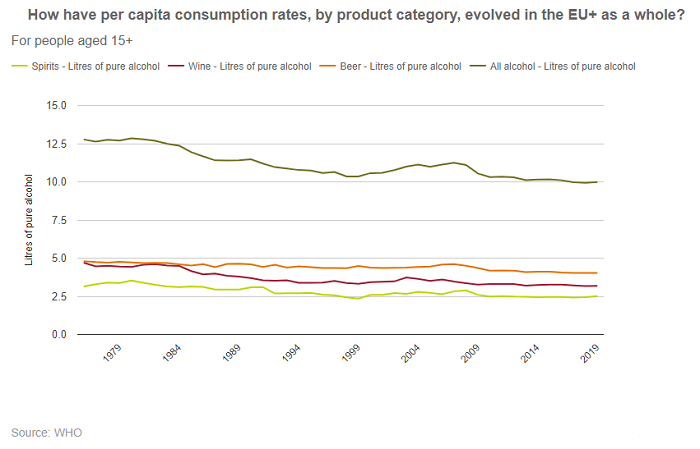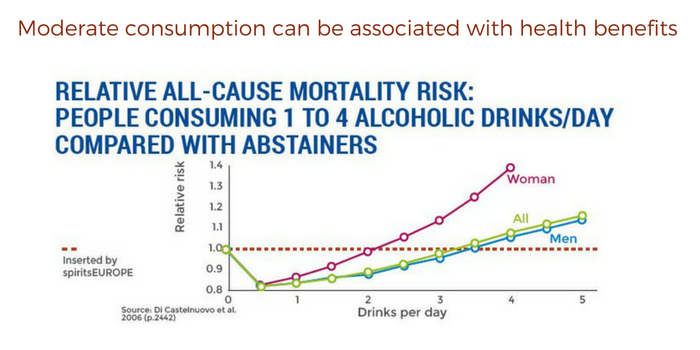Europe is the region with the highest consumption of alcohol per person but looking only at the drinking population, it ranks third after Africa and S.E. Asia according to WHO. Yet, high levels of consumption do not equal high levels of harm.
Per capita consumption across Europe (WHO – For people aged 15+)

Europeans drink much less than they did 30 years ago – a 25% downward trend between 1979 and 2019 that WHO predicts will continue past 2025.
More than 80% of the population aged 15+ represent moderate drinkers and numerous scientific studies show that healthy adults who consume alcoholic beverages in moderation may face a lower risk for a number of conditions, in particular age-related risks such a coronary heart disease, ischemic stroke, diabetes and dementia.
In the EU+ (including Norway, Switzerland and the UK) heavy episodic drinking decreased between 2010 and 2016 by -10.7%, according to the WHO ‘Status report on alcohol consumption, harm and policy responses in 30 European countries 2019’ publication (here). The increasing trend of moderate alcohol consumption, combined with a decrease in both heavy episodic drinking and long-term excessive drinking, is reflected in the declining data on alcohol-related harm in the EU+ region between 2010 and 2016. (ibd):

Alcohol abuse results in adverse consequences such as liver cirrhosis, reduced work capability, injury, social disorder, costs to healthcare systems. Alcohol dependence is itself a serious illness, with consequences also for the person’s family and third parties. While alcohol-related harms are found in all countries, the scale of the problems varies from country to country –depending on a complex mix of cultural, social and economic drivers.
As stated by the WHO, it is important to understand that “alcohol-related harm is determined (…), by three related dimensions of drinking (irrespective of the choice of beverages): the volume of alcohol consumed, the pattern of drinking and, on rare occasions, also the quality of alcohol consumed.” there is clearly a cultural complexity to alcohol consumption in Europe and alcohol-related harm is largely related to high risk drinking behaviour.

European spirits producers are actively engaged in changing risky drinking behaviours and attitudes toward alcohol consumption.
Our sector’s long term commitment is reflected in hundreds of prevention initiatives put in place since 2006 when the first EU Strategy on alcohol (and related Alcohol & Health Forum) was adopted in 2006. The prevention campaigns to fight risky drinking behaviour and promote responsible drinking - including during lockdown - have been sustained over the years by local producers together with their stakeholders. As part of our commitment, we also put together a detailed report on all these actions, many of them including measurement and evaluation processes to quantify the progress made and adjust the strategy as necessary. Click here for the full report 2023.
Pan-European campaign to promote Responsible Drinking- Take the RDQ!
Educational online quiz for adults in 18 countries to raise awareness about responsible drinking. The quiz is part of the spirit sector’s commitment made under the European Commission’s Code of Conduct on Responsible Food Business and Marketing to roll out responsible drinking initiatives in all EU Member States by 2030.
Actions during lockdown
Further reading: